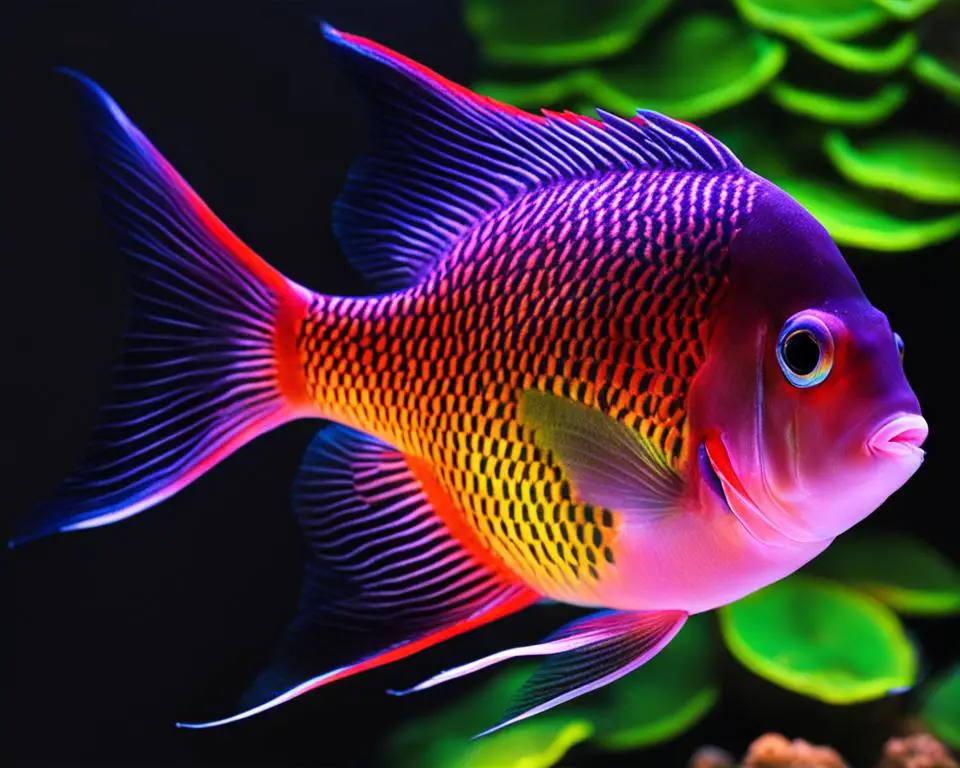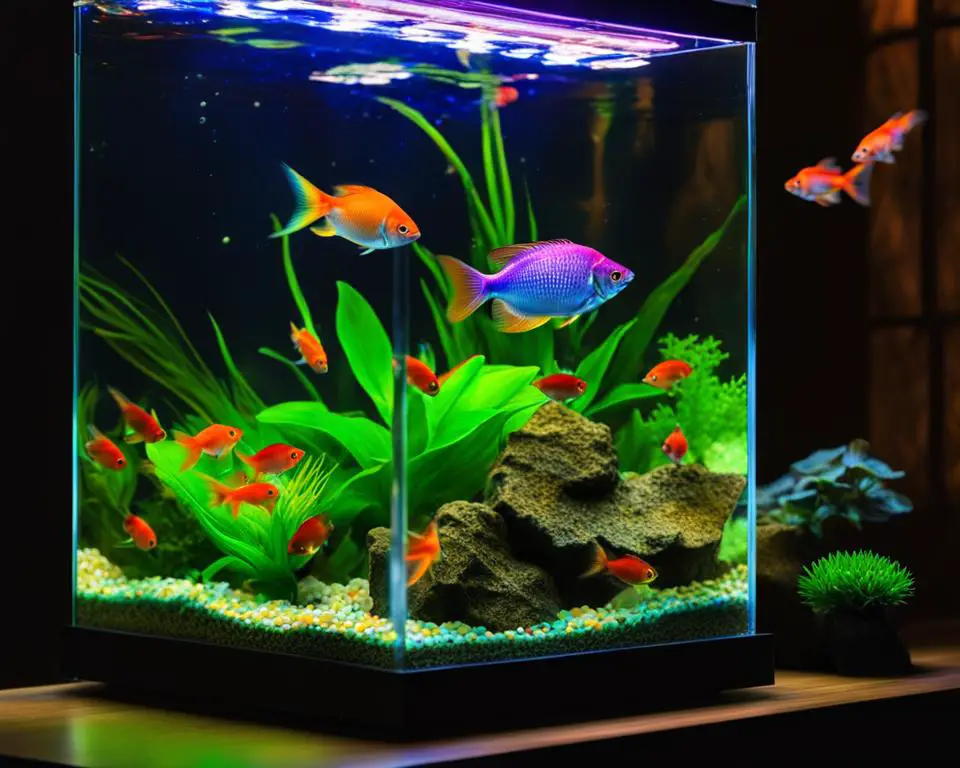If you’re a proud owner of Glofish, you may be wondering if they require a constant source of light. It’s a common misconception that fish don’t need light, but the truth is, light plays a critical role in the health and well-being of Glofish.
Understanding their lighting requirements is crucial to creating an ideal environment for your fish to thrive. In this article, we will explore the importance of light for Glofish and how you can provide the best lighting conditions for their aquariums.
Key Takeaways:
- Glofish require light for optimal health and well-being
- Proper lighting can enhance their growth, behavior, and coloration
- There are specific lighting needs and schedules to follow for Glofish aquariums
- Choosing the right type of lighting and optimizing its setup is crucial for your fish
- By following these guidelines, you can create a vibrant and thriving environment for your Glofish
Understanding Glofish Lighting Needs
When it comes to keeping Glofish, understanding their lighting needs is crucial for their overall well-being. Light plays a vital role in their growth, behavior, and even their coloration. As a responsible owner, it’s essential to ensure that your Glofish have adequate lighting in their aquarium.
First and foremost, it’s important to note that Glofish are a genetically modified version of Zebrafish, which are native to murky water conditions in Southeast Asia. This means that they are accustomed to low light environments. However, this doesn’t mean that they don’t need any light at all.
The importance of light for Glofish cannot be understated. One of the primary functions of light is to facilitate photosynthesis in the plants in their aquarium. If your aquarium doesn’t have live plants, then light is still essential for your Glofish as it helps regulate their circadian rhythm and metabolism.
Furthermore, the coloration of your Glofish is directly linked to the amount of light they receive. If they don’t receive the right amount of light, their colors may appear faded or even change altogether. Therefore, it’s crucial to ensure that they receive the right amount of light on a regular basis.
Tip: To ensure that your Glofish have the right lighting conditions, invest in a good quality aquarium light. It’s recommended to have around 8-12 hours of light per day, with a wavelength of 400-460 nm to promote plant growth and enhance the coloration of your fish.
While it’s important to provide your Glofish with enough light, it’s equally crucial not to overdo it. Excessive light can lead to algae growth, which can affect the oxygen levels in the aquarium and the health of your fish. Therefore, it’s essential to find the right balance of light to ensure the optimal environment for your Glofish.
In the next section, I will delve into the practical aspects of providing adequate lighting for your Glofish. We will explore whether Glofish require constant light, the best lighting options for their aquarium, and how light affects their overall well-being.

Providing Adequate Lighting for Glofish
If you want to ensure the health and vibrancy of your Glofish, it is crucial to provide adequate lighting. But do Glofish require constant light? Let’s explore the answer to this question and other aspects of providing proper lighting for Glofish.
Do Glofish Require Constant Light?
No, Glofish do not require constant light. In fact, providing too much light can be harmful to their health. Experts recommend providing 8-12 hours of light per day, followed by 12-16 hours of darkness to simulate their natural habitat. Additionally, it is essential to turn off the light at night to prevent disturbing their sleep and circadian rhythms.
Best Lighting for Glofish Aquariums
When it comes to the best lighting for Glofish aquariums, there are several options to consider. LED lights are a popular choice due to their energy efficiency and the ability to customize the spectrum of light. Blue lights are also ideal for showcasing the fluorescent properties of Glofish’s coloration. However, it is important to choose high-quality lights to ensure that the light intensity and spectrum meet the specific needs of your Glofish.
How Light Affects Glofish
Light plays a crucial role in the growth, behavior, and coloration of Glofish. Adequate lighting is essential for their overall well-being and can impact their physiological processes, such as metabolism and hormone production. Additionally, light can affect their mood and behavior, including their activity levels and feeding patterns. Therefore, providing the right amount and quality of light is essential to keep your Glofish healthy and happy.
Optimizing Your Glofish Aquarium Lighting
To optimize your Glofish aquarium lighting, consider the following factors:
| Factor | Consideration |
|---|---|
| Intensity | Ensure that the light is not too bright or too dim for your Glofish’s species. Glofish that require high light levels should have lights with higher intensity than those that require lower light levels. |
| Spectrum | Choose a light that provides the ideal spectrum for your Glofish’s coloration. For example, blue light enhances the fluorescent properties of Glofish, while red light can bring out their natural coloration. |
| Duration | Provide 8-12 hours of light per day, followed by 12-16 hours of darkness to simulate their natural habitat. Turn off the light at night to prevent disturbing their sleep and circadian rhythms. |
By considering these factors and choosing the right lighting setup, you can ensure that your Glofish thrive in their aquarium environment.

Optimizing Your Glofish Aquarium Lighting
Choosing the right lighting for your Glofish aquarium is essential to their overall health and well-being. Glofish require adequate lighting to maintain their vibrant colors and support their growth and behavior. In this section, we will discuss how to provide the optimal lighting for your Glofish aquarium.
Do Glofish Need a Light Source?
Yes, Glofish require a light source to thrive in an aquarium. Light is crucial for their photosynthesis process and supports the growth of beneficial bacteria that contribute to maintaining water quality. Without adequate light, Glofish may become stressed and fall ill.
Optimal Lighting for Glofish
The optimal lighting for Glofish depends on several factors, including the intensity, spectrum, and duration of light exposure. The recommended range of intensity for Glofish aquariums is between 1.5 and 3 watts per gallon. A light spectrum of 6500K – 7500K is ideal for Glofish as it promotes plant growth and enhances the colors of the fish. It is essential to provide a lighting schedule of 8-12 hours a day, simulating natural daylight.
Types of Lighting Options for Glofish Aquariums
There are several types of lighting options available for Glofish aquariums, including fluorescent, LED, or incandescent lights. LED lights are the most popular as they are energy-efficient, long-lasting, and come in various spectrums. Additionally, LED lights do not emit as much heat as traditional lights, which is beneficial for Glofish.
Other Considerations for Glofish Lighting
When setting up your Glofish aquarium lighting, it is crucial to avoid direct sunlight or lighting that produces heat as it can raise the temperature of the water and cause stress to the fish. It is also important to keep the light fixtures clean to ensure maximum light output, and avoid leaving the lights on for extended periods to prevent overexposure.
By providing the optimal lighting for your Glofish aquarium, you can create a vibrant and healthy environment for your fish to thrive. Maintaining proper lighting conditions will enhance their colors, improve their behavior, and support their overall growth and well-being.
Conclusion
After exploring the lighting requirements of Glofish, I hope this article has shed some light on how important proper lighting is for their overall well-being. By providing adequate lighting, you can enhance their growth, behavior, and coloration, creating a stunning environment that allows your Glofish to thrive.
Remember that understanding their specific lighting needs is essential in creating an optimal aquarium environment, and there are several factors to consider, such as intensity, spectrum, and duration of light exposure.
With the insights and guidance provided in this article, you can confidently choose the best lighting options for your Glofish aquarium, ensuring their health and vibrancy for years to come.
FAQ
Do Glofish always need light?
Yes, Glofish require light for their overall well-being. Light helps with their growth, behavior, and coloration.
What are the lighting needs for Glofish?
Glofish need adequate lighting to thrive. Light is essential for their health and vibrant appearance.
Do Glofish require constant light?
Glofish do not require constant light. It is recommended to provide them with a lighting schedule that mimics their natural day-night cycle.
What is the best lighting for Glofish aquariums?
LED lights are commonly used for Glofish aquariums because they offer the right intensity and spectrum of light. They are energy-efficient and provide optimal conditions for your Glofish.
How does light affect Glofish?
Light plays a vital role in the growth, behavior, and coloration of Glofish. It helps regulate their biological processes and overall well-being.
How can I provide adequate light for my Glofish?
Ensure you have the right type of light, such as LED lights, and provide a lighting schedule that includes both light and darkness. Monitor the intensity and duration of light exposure to optimize their environment.
Do Glofish need a light source in their aquarium?
Yes, Glofish require a light source in their aquarium to thrive. Adequate lighting is essential for their overall health and well-being.
What is the optimal lighting for Glofish?
The optimal lighting for Glofish includes LED lights with the right intensity and spectrum. It is important to create a lighting setup that mimics their natural habitat and provides a balanced environment.